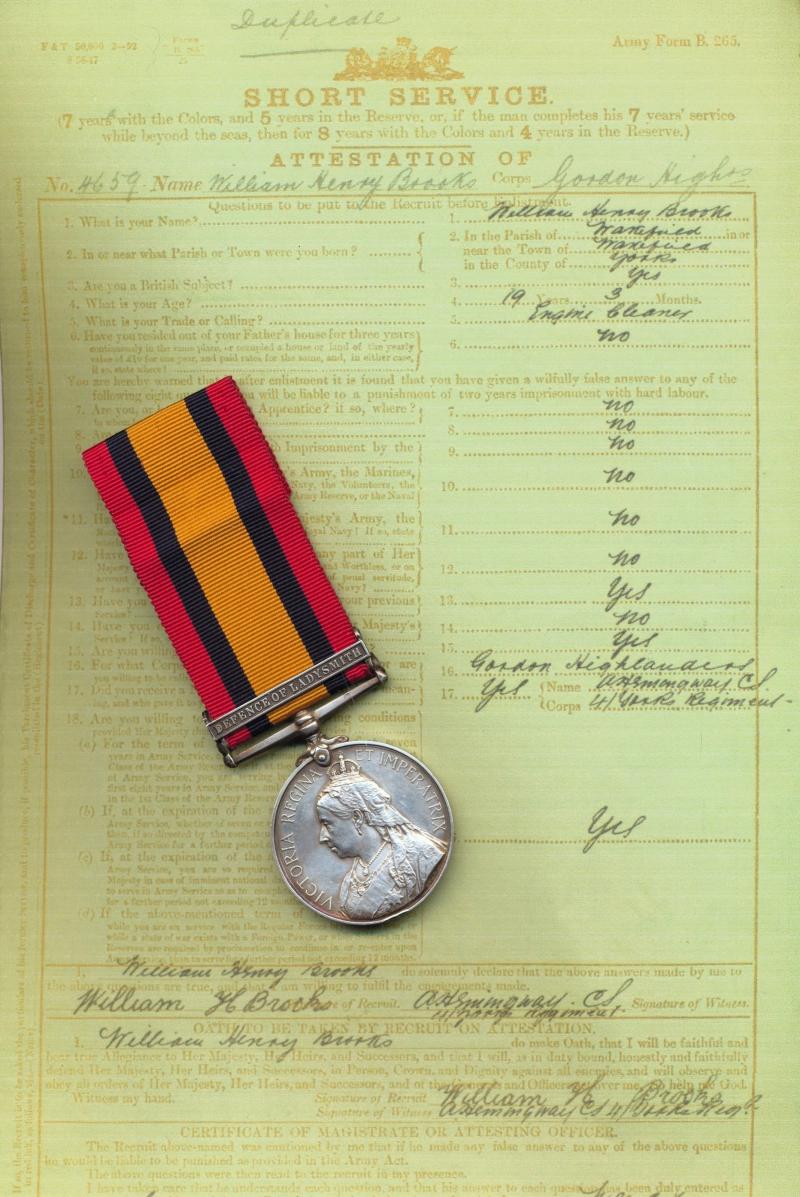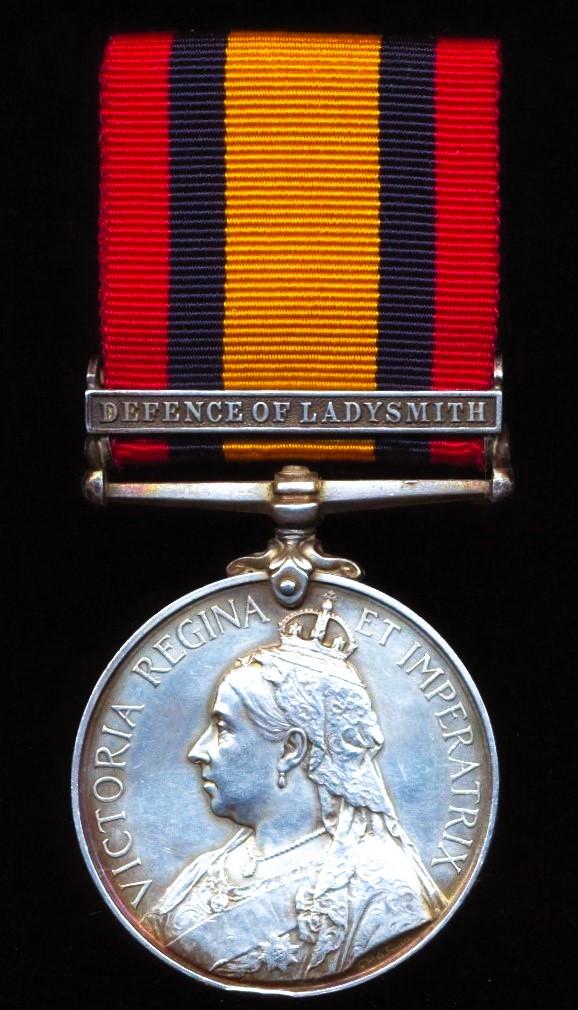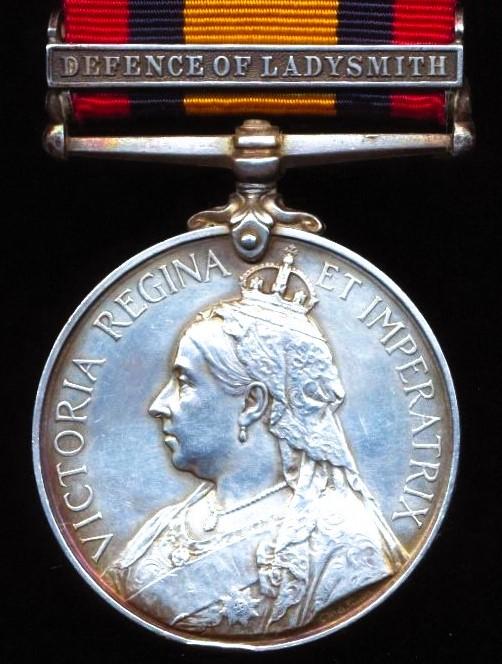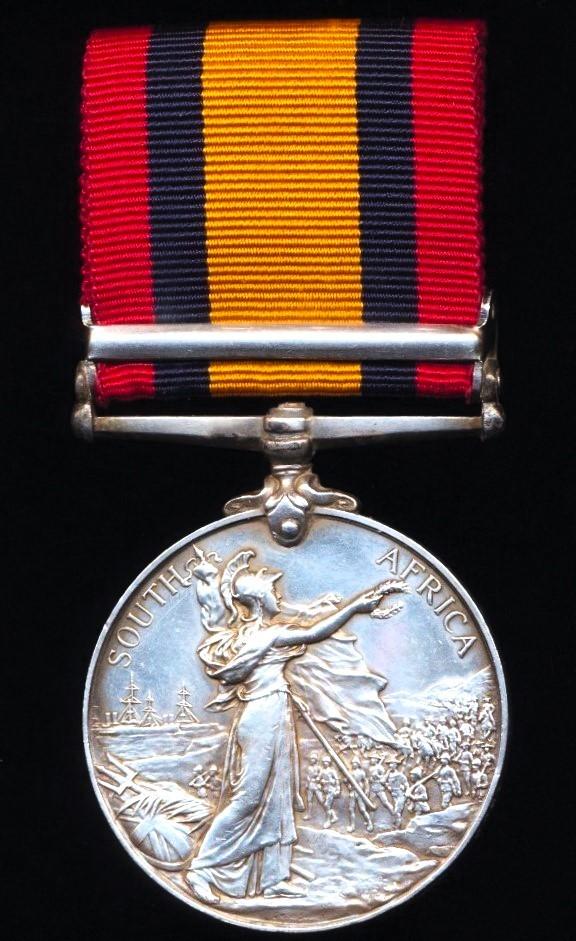Queens South Africa Medal. Silver issue with 1 x clasp 'Defence of Ladysmith' (4659 Pte. W. Brooks, Gordon Highrs:)
Medal(s) and clasp(s) verification: The recipients entitlement to the QSA medal and single clasp is confirmed per the respective campaign medal roll for the 2nd Battalion Gordon Highlanders. Additionally the recipient had prior been entitled to a n IGS 1895 medal with 2 x clasps for service with 1st Battalion Gordon Highlanders. Both medal rolls referenced below:
- IGS 1895 with 2 x clasps 'Punjab Frontier 97-98' & 'Tirah 97-98': WO 100/89 compiled, Gharial, India, 05/08/98
- QSA Medal & clasp 'DOL': WO 100/203 compiled, Pietersburg, South Africa, 15/07/01. With remark 'To England'
In addition to above, the below following awards were issued to his wife as his notified next of kin, Louisa Brooks, of Box 78, Coronation Park, Regina, Saskatchewan, Canada, in respect of her husbands services overseas in France (inc 1st Ypres), where he was 'Wounded in the Head with Shrapnel', while serving with the Canadian Expeditionary Force
- 1914-15 Star: Ref 'Canada, World War I CEF personnel Files, 1914-18'
- British War Medal. Silver issue: Ref 'Canada, World War I CEF personnel Files, 1914-18'
- Interallied Victory Medal: Ref 'Canada, World War I CEF personnel Files, 1914-18'
- Memorial Cross: 'Canada, World War I CEF personnel Files, 1914-18'
- Memorial Plaque: 'Canada, World War I CEF personnel Files, 1914-18'
Died of Illness Contracted on Active Service: 12818 Private William Henry Brooks, who served with "B" Company' 5th Battalion Canadian Expeditionary Force, and fought in France. He died of illness attributed to his 'War Service', in Canada on, 19 December 1921
William Henry Brooks, eldest son of Richard Brook and Isobella Brook (nee Horn) was a native of, Wakefield, Yorkshire, England, where he was born on, 6 June 1873. Prior to joining the British Army, he was employed as an 'Engine Cleaner'. He claimed to be 19 years & 3 months of age, when he enlisted for service with the British Army, at, Leeds, Yorkshire, England, on, 4 October 1892. On the same day he was enlisted he was posted to the Gordon Highlanders (the regiment of his choice), and the next day joined the Regimental Depot located in, Aberdeen, Scotland. After completion of his basic training, he was, on, 7 February 1893, posted to 2nd Battalion Gordon Highlanders. William was subsequently transferred to the 1st Battalion Gordon Highlanders, on, 5 March 1893, with which battalion he subsequently served overseas in British India, seeing active service during the North West Frontier campaigns of 1897-98, during which his regiment won undying fame and two Victoria Crosses for their gallantry at the Storming of the Dargai Heights. William transferred to the 2nd Battalion Gordon Highlanders on, 12 September 1898. He then served overseas on active service during the South African War, being present during the 'Defence of Ladysmith' (a battle honour awarded to his regiment). As a consequence of being found to be 'Medically Unfit' he took his final discharge from the British Army on, 27 May 1901. He had completed a total of 8 years & days 236 days service with 'The Colours'. Most of his service being spent overseas
The recipient's record of service was:
- Home: 04/10/1892 - 02/02/1894
- British India: 03/02/1894 - 02/09/1899
- South Africa: 03/09/1899 - 29/09/1900
- Home: 30/09/1900 - 27/05/09/1901
Following his discharge from the British Army, William returned to his home-roots in Wakefield, Yorkshire, England. The 1911 National Census for England records him living with his wife Isabella Brooks, living at the family residence located at, where they lived with their children (comprising sons & daughters). In 1911, William was employed as a ,. In 1911, William Henry Brooks migrated to Canada, where the family settled in Regina, Saskatchewan. William enlisted in the Canadian Expeditionary Force in 1914, and subsequently served overseas in France & Flanders, where he fought at the first battle of Ypres, as a member of "B" Company, 5th Battalion Canadian Expeditionary Force. While serving in France he was 'Wounded-in-Action', receiving shrapnel to the head. William Henry Brooks died in Regina, Saskatchewan, on, 19 December 1921. Cause of death was 'Attributed to War Service'
The recipient's notified next of kin was recorded in his British Army service papers, and were his father, shown as Richard Brook (sic), of 29 Kimberley Street, Tong Road, New Wortley, Leeds, and below his mother shown as Isabella Brook (sic) residing at, 26 Cardley Street, Tong Road, New Wortley, Leeds
The recipients British Army service papers are extant and accessible at The National Archives
Gordon Highlanders 1899-1902: The Gordon Highlanders had the distinction of being the most decorated infantry regiment of the British Army for their service during the South African War, where both regular battalions (and several Volunteer Service Companies) earned the below following battle honours, as well as 6 x Victoria Crosses
- Defence of Ladysmith (2/Gordons)
- Paardeberg (1/Gordons)
- South Africa 1899-1902
- Captain Matthew Fontaine Maury Meiklejohn (2/Gordons, for Elandslaagte, 1899)
- Sergeant-Major William Robertson ( 2/Gordons, for Elandslaagte, 1899)
- Captain Ernest Beachcroft Beckwith Towse (1/Gordons, for Magersfontein, 1899)
- Lance-Corporal John Frederick Mackay (1/Gordons, for Crows Nest Hill, nr Johannesburg, 1900)
- Captain William Eagleson Gordon (1/Gordons, for action nr Krugersdorp, 1900)
- Captain David Reginald Younger (1/Gordons, for action nr Krugersdorp, 1900 - a posthumous award)
Sold together with hardcopy photocopied set of British Army service papers together with extract entry page from the respective campaign medal roll
Condition: About GVF
Code: 23489







